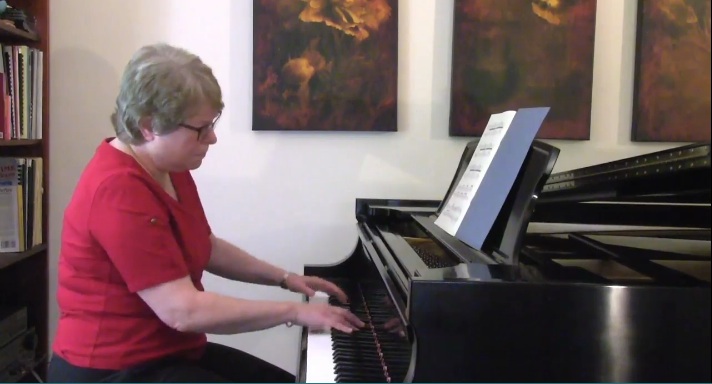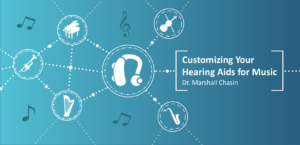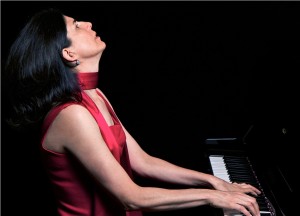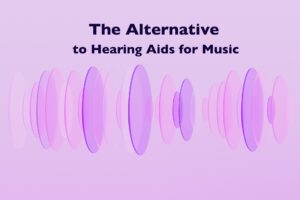For every decibel that amateur pianist Joyce Morton has lost in hearing, she has gained double the wisdom about how to keep on making music despite her hearing loss. In this exclusive interview with Grand Piano Passion™, she shares her top five tips about playing an instrument while wearing hearing aids.
1. Accept your hearing loss
A diagnosis of hearing loss often comes with denial (at first, Joyce was only willing to wear one hearing aid although her audiologist told her she needed them in both ears). But coming to terms with having a hearing loss and wearing hearing aids eventually led to deeper connections with the people around her.
2. Persist in wearing your hearing aids
With a new pair of hearing aids, the world will initially sound different—perhaps even unpleasant. Joyce’s advice is to view the first few months as a necessary trial period to “break in” your hearing aids and get accustomed to wearing them.
3. Create a custom setting on your hearing aids for playing music
Even if your hearing aids come with a music setting, Joyce explains that the setting is geared towards listening to music, not playing an instrument. Work with your audiologist to adjust the setting based on your practice and performance needs—a solution may be to simply lower the amount of amplification, or volume.
4. Recognize that your instrument may sound different when you’re wearing hearing aids
When you first go back to making music while wearing your hearing aids, you can expect your instrument to sound different to you; the quality and tone of the notes, not just their volume, may be affected. In fact, Joyce’s assessment of her own Steinway L piano changed completely after she began practicing while wearing hearing aids.
5. Celebrate the musicality that your hearing aids make possible
Persist through a trial period with your instrument as well as in everyday life and conversation. If you have any doubts that you can continue to enjoy playing music and playing it well, observe Joyce as she performs Liszt’s Un Sospiro.
Don’t miss my full interview with Joyce Morton, interspersed with her playing the second movement of Beethoven’s Appassionata Sonata.





As a percussionist with moderate to severe hearing loss I can totally relate. Hearing loss was found 20 yrs ago as mild to moderate, however at 62 I now wear high power resound digitals(RIC). A music program has been added and modified several times in the past couple of years . Drums being very different than grand pianos, emit a slurry or package of sound that includes hi-decibels and a wide array of frequencies and timbres. I now play and teach rhythms on hand drums exclusively. I cannot use my digitals due to severe distortions. I have gone back to wearing a old pair of BTE Sonic Ions they reduce the distortions, however they also eliminate many of the the wonderful timbres an nuances of hand drumming and they don’t work for speech very well . I have had to reduce my expections of today’s high-tec hearing aids. I would like to try a pair of Digi_k, analog HA,s just to see if they would be a better option. Hoping someone in this group has had som experience with these or or other options …
Thanks for writing and sharing how you are addressing the challenges of being a musician with hearing loss. Have you tried lowering the amplification on your music setting as Joyce suggests in this article? I have had mine lowered by 3db with good results on the piano. https://grandpianopassion.com/2015/06/23/find-right-audiologist-service/ Also, I’m very interested in trying Sensaphonics new solution..when I do, I’ll alert you to the article.
I was a vocalist and church choir director. When I began wearing hearing aids, they were not digital and caused a lot of occlusion. I could not really hear my own voice or enjoy singing. Now that I have digital aids, I would like to get back into it as I have a semi-open fit earmold that allows some natural sound to my ears. It would be nice to hear from other singers as to how they handled this. My loss is severe to profound.
Great to hear that your hearing aids are working well for you! Check out the Association for Adult Musicians with Hearing Loss. I’m a member! They have a private group on Facebook that is really useful. https://www.musicianswithhearingloss.org/wp/
I am wearing Zerena 9 aids. I am a singer-songwriter with piano as my primary instrument. I need to hear both my vocal and the piano at the same time as well as others on stage. The voices are fine, but the piano or the keyboards sounds horrible. Like it is being played through a rotating fan. The live sound is hideous. I have tried numerous presets and adjustments with my technician and NOTHING is working. We have tried both open cone and a closed and neither is working. I have even written to the manufacturer with no response at this point. Any thoughts to what I can do to make this bearable? I really need a solution as this is what I do for a living.
Jeff, I’m glad you reached out. Your situation sounds frustrating and difficult. Although I would caution that hearing aids are limited when it comes to music since they focus on amplifying conversational frequencies, I do wonder whether there’s room for improvement with your Bernafon hearing aids. The parent company is Oticon. I’m going to reach out to them now, to see whether they could provide some assistance directly to you and your audiologist. Of course I can’t promise on how they will respond, although I certainly hope they will. Best, Nancy
Nancy,
Thanks for the response. I am hopeful that something can be done. Hearing the voice without also hearing the piano at a quality level not at all beneficial. Thanks for at least trying.
Jeff.
To my readers: When I asked Jeff how it went, he gave the reply below. Oticon, Phonak, Widex, Signia, Starkey, and ReSound, this is valuable input for product development:
Nancy, I just wanted to give you an update. I took a keyboard into the audiologist and played while she adjusted the frequencies as best she could. A representative from Bernafon was on conference throughout the process. They are at least trying very hard and everybody is attempting to get a resolution.
When I got home I played my acoustic piano and while it’s quite a bit better, I don’t think they will ever be able to eliminate the waffling sound entirely. Perhaps the technology just can’t match it yet. And maybe I need more time to adjust. Or maybe it’s as good as it’s going to get.
But I do think they are trying. They are all listening, being respectful, professional. My instincts tell me that the audio quality for the piano has plateaued and I will need to learn to live with that sound.
Jeff
I’ve recently been told that I need to wear hearing aids. On low income, these will be a basic NHS model. When I asked how this would affect my piano playing of 54 years, I was told that it would no longer be possible to continue playing. Seems a big price to pay
Hi Tim, thanks for writing. This sounds like a difficult situation. I am not sure if I understand, though, why you would not be able to continue playing? Do you mind my asking what type of clinician told you that and the reason given? Do the basic NHS model of hearing aids include a music setting? Or could your audiologist create a custom music program for you? Please see this article about creating a music program that you can take into your audiologist. https://grandpianopassion.com/2019/01/21/chasin-optimize-hearing-aids-music/
Another option: I’m currently trying out the 3DME in-ear monitors and finding that the sound quality is much better than my prescription hearing aids. They are worth taking a look if your budget permits. Nancy
I’m a classical pianist with hearing loss, still looking for the best hearing aids that lets me hear my piano playing naturally. Any suggestions?
Hi Charles, thanks for writing. Since everyone’s hearing loss is different, I can’t recommend a specific brand or model. The best place to start is with a good audiologist, and I recommend that you put some work into selecting one that fits well with your needs (here’s my post with more details: https://grandpianopassion.com/2015/06/23/find-right-audiologist-service/). Another avenue is to make sure that your music setting is programmed properly (more details here: https://grandpianopassion.com/2019/01/21/chasin-optimize-hearing-aids-music/). Good luck!
After a full year of tweaking my aids and seeing different audiologists(sounds like a headline in a tabloid newspaper) I have not been able to use my hearing aids in live performance. I have had to resort to an in-ear monitor as the best solution. It was the only way that I could get quality sound for both my vocal and piano. I just keep my aids right at the piano so I can pop them in at the end of a performance and have conversation with those who had come. The last audiologist who I met with is also a musician and really understood what I was looking for. He said that presently the manufacturers are not focused on live performance when it comes to hearing aids. They design them for speech. Is the technology available? My guess it probably is, but with the necessary frequency adjustments and decibels needed for music, they probably won’t do it because of liability. I heard it explained this way. If someone is speaking around 120 decibels, they are probably shouting, but fortissimo in music at the same level is to be expected from time to time. Our current hearing aids don’t know the difference.
For now the in-ear monitors will have to do. It’s extra work and setup, but always worth it for my live performances. Hopefully someday I won’t have to keep switching back and forth.
Jeff, thanks for keeping us updated on your experiences! Best, Nancy
Jeff, what in-ear monitor are you using? I have been trying out the 3DME in-ear monitor, and I am reveling in the enhanced sound quality.
Nancy,
I am using the 3DME in-ear monitor and I do like it if I’m only playing piano. However, as a singer-songwriter I’m also at the piano singing as well. Then the issue becomes the piano is so loud I can’t hear my vocal as well. The solution there has been to add another transmitter to my belt pack. I then direct my vocal to the separate monitor which has an output, that feeds into the 3DME. So now I am wearing three. One for my head worn mic, one for additional monitor, and one for the 3DME.
So yes the 3DME is a partial solution for my application.
It works, but only when I’m lucky enough to have a skilled sound engineer running the board. At the moment it doesn’t seem to matter as I have lost so many gigs (about 50) since Covid and none have returned. Here’s to hoping some gigs are coming my way.
Hi Jeff, thanks for explaining all of this. It sounds complicated when you are singing at the piano! I really hope some more gigs come your way too!
Hello Nancy,
As a performing classical violinist and music teacher, I am at the point of needing hearing aids to do my job. One symptom I am experiencing is pitch distortion. Certain frequencies often sound off by a semi-tone but not always. The music or instrument will sound muddy or out of tune to me. What hearing aids or IEMs have the best chance of giving me the natural sound of my violin in a string quartet and will aids help me hear pitches correctly?
Hello CJ, I’m sorry to hear about the trouble that you’re having with your hearing, and I completely relate. Based on my personal experience with hearing aids and in-ear monitors, I would suggest that you try ASI Audio’s 3DME in-ear monitors. This is an independent recommendation – I’m just a very enthusiastic user. I can’t believe how much better the sound quality is for music than my hearing aids, even with the best hearing aid setting possible. Here’s my review. https://grandpianopassion.com/alternative-hearing-aids-music-3dme-in-ear-monitors/
Also, here’s more about my journey from switching from hearing aids to the 3DMEs for all things music: https://grandpianopassion.com/switching-from-hearing-aids-music/
Regarding the pitch distortion, I’m going to ask Dr. Marshall Chasin and the folks at ASI Audio to chime in here with their perspective. More soon.
Thank you for your fast reply! I am encouraged by your experience with the IEM’s
Pitch distortion problems are commonly seen with more significant hearing losses where a pitch may be heard as a half step flatter than it is. There are some things that can be done and it doesn’t matter which hearing aid(s) you have. You should talk to your audiologist who can assess you for any “cochlear dead regions” and take appropriate steps to minimize the effects. Usually, this pitch issue is for louder sounds but becomes less of an issue for quieter sounds. The hearing aid prescription/adjustment may be as simple as reducing the amount of gain or boost that the hearing aids provide with louder level inputs associated with music
Thank you for your insight Marshall!
It is an odd experience because the pitch change can happen without warning and then the next moment not be a problem at all. I can play two notes 1/2 step apart in the low register on a guitar that sound identical. I play them again and again and nothing changes. I can go away for a few minutes then try it again and hear everything just fine. If it is a dead area, why isn’t it happening all the time?
Hello CJ, I forwarded your comments to our parent company, Sensaphonics, Dr. Shannon Switzer, AuD. This is her reply:
This sounds like the patient is experiencing a symptom called “dysacusis,” which is difficulty processing the details of sound due to pitch distortion. With the 3DME app, the musician will have a very high degree of control over the pitch and volume of the microphones and can adapt the system to her listening needs day-by-day and setting-by-setting.
Before the musician obtains the 3DME system, I strongly recommend they see an audiologist for evaluation given the symptoms that they are experiencing. Please direct them to our network of Gold Circle audiologists who can perform the necessary testing and then monitor their hearing with annual re-evaluations. https://www.sensaphonics.com/pages/find-an-audiologist
Hello and thank you for your insight and expertise Dr Switzer! I do have a regular audiologist and am seeing them today. Thank you for the IEM recommendations and I hope this will help me move forward.